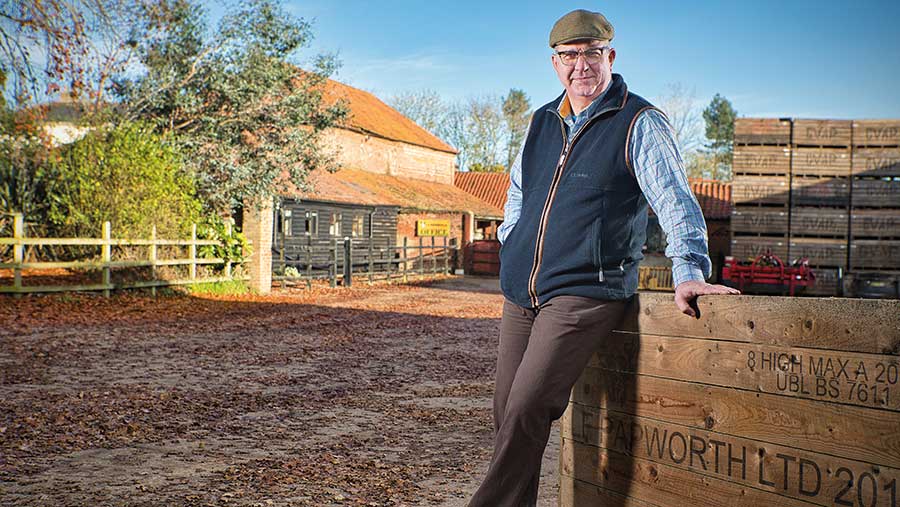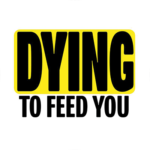Dying to feed you: Tim fell 14ft and lost part of his skull
 © Richard Stanton
© Richard Stanton Norfolk farmer Tim Papworth spent five weeks in a coma and had part of his skull removed after falling from a ladder.
Tim took an easy route to a job, that on the face of it looked simple, but it cost him dearly. It took a year of rehabilitation, in which his wife had to remove the work guns from the house as he was so depressed.
His advice is to take the more time to do the job and think about what you’re doing .
Watch the video of Tim telling his story and read the full report below.
Videographer: Richard Stanton
See also
It was mid-October – one of the busiest months on the farm. My alarm went off at 5.45am, which is normal for me every day of the week. I got up, got dressed, went downstairs, and had a cup of tea.
I look after the beef cattle at Lodge Farm in the village of Felmingham – between the market towns of Alysham and North Walsham, in north Norfolk. I also look after the vegetable enterprise – mainly potatoes.
I had a telephone conversation with my cousin, who I farm with, to sort out what we were doing for the day. We went to see the potato harvester first – to make sure the guys in the field were lifting the potatoes correctly.
Then I went to the store to see my store manager. He told me that he had a slight problem – that it was dark and dangerous because the light bulb had gone. I went up the ladder to put in a new bulb so the job would be sorted.
Ladder
I didn’t think at the time that there might be a safer and less risky way of doing it. I thought I would take the easy route and use a ladder. I don’t know how I fell, but I fell about 14ft – I couldn’t grab anything and I fell very badly.
I was told it took two people to hold me down because I was in this fight or flight mode. I was hurt and I wanted to get the hell out. I was airlifted to hospital where they put me in an induced coma.
I had two bleeds on the brain and multiple fractures to my skull, a punctured lung, several broken ribs and a small broken bone in my neck. Surgeons had to operate to ease the pressure on my brain – and eventually they ended up replacing part of my skull with a titanium plate.
Hospital
The first memory I have after the accident is waking up in Addenbrooke’s hospital. I’d been in a coma for five weeks, with pipes and tubes down my throat. They fitted me with a voice box that I could press to push some air through so I could speak.
My left arm didn’t work – it was hanging there because I had hit the right side of my head, which had paralysed the left side of my body. It was a good year before I was able to work it properly.
It affected my whole family and work colleagues – everybody really. They all had to help me to eat, to get dressed, to do anything. There were times when
I thought the best thing I could do was just to get out of there.
Mental toll
It started to play on my mental health. My wife was advised to have the guns removed from the house because there were some really dark moments where I thought I was just a drain on the family. Fortunately, I didn’t have the means to be able to go through with it.
The one thing I would suggest that people do is to take more time. Think about what you’re doing. And then take more time to do the job. Do it properly, and don’t trust luck.
Luck is nothing you can actually bank on. I’ve been lucky – very lucky. You can’t say to someone, “Oh, you’ll be alright if you’re lucky.” You might not be as lucky as me.
How to prevent accidents working at height
Even the simplest of tasks can cause serious injury or death. In relation to working at height:
- Rule number one is to minimise the need to work at height, wherever possible
- If you can’t do that, plan the work carefully to reduce risks
- Use light bulbs with the longest possible life to lessen the number of changes necessary
- Avoid using a ladder as a work platform
- Use a mobile elevated work platform – such as a cherry picker – rather than a “man cage” on a telescopic handler
- Always use safety harnesses. Ensure staff are trained properly and able to quickly recover a worker suspended in a harness, should they fall
- Don’t work alone at height
- Ensure the building is empty and the access is good.
Source: Safety Revolution
More Farmers Weekly resources
Dying to Feed You
 About the campaign
About the campaign
Farming has the highest number of workplace fatalities of all occupations. Farmers Weekly is pledging to use its voice, influence and reach to reduce the accident rate in agriculture.
Find out how you can be a part of helping us change agriculture’s safety record at fwi.co.uk/dying-to-feed-you
Partner message

The team at Safety Revolution are delighted to be working with Farmers Weekly to reduce deaths in agriculture and to show how we can work together to create safer farms.
Building strong and positive safety cultures delivers happy and safe teams, fewer incidents and improved productivity. We look forward to exploring individual case studies and shining a light
